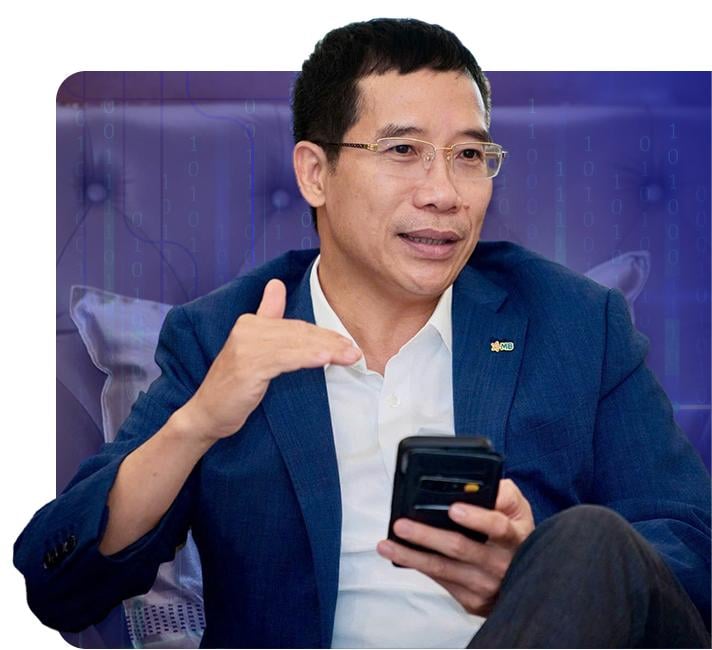Vietnamese lender MB fully embraces digitalization to redefine banking
By completely overhauling its recruitment approach and breaking traditional boundaries, Vietnam's leading creditor MB is redefining banking through an intelligent data-driven platform.
A decade ago, MBBank (MB) like many other banks - relied on manual processes, cumbersome paperwork, and fragmented systems. But rapid shifts in user behavior and mounting pressure from the technology wave gradually rendered this model obsolete.
2017 marked a turning point in MB’s development journey. Its leadership recognized that to avoid falling behind, the bank couldn’t settle for minor tweaks or simply digitize a few processes. Instead, MB needed a full-scale transformation - a complete redefinition of how a bank operates and delivers value in the digital age.
For nearly a decade, MB has stayed the course with a bold strategy, gradually building three solid pillars that set it apart: a smart operating platform powered by data, a proactive security system that anticipates risks, and a digital-first workforce culture - transformed from mindset to skillset.

Luu Trung Thai, chairman of the board of directors at MB. Photo courtesy of the bank.
Not just building a banking app
At the start of its transformation, MB defined its vision clearly: digital transformation goes beyond simply “building an app” - it’s about creating an intelligent financial ecosystem driven by data and advanced algorithms, a true “paperless bank.”
The bank strived to move past traditional banking boundaries toward a seamless, personalized digital ecosystem that offers each customer a tailored financial experience.
However, the transformation journey has never been easy. MB had to completely overhaul its core systems, redesign processes, and shift the mindset of tens of thousands of employees from traditional to digital.
Amid a cautious market and a volatile economy, the bank remained steadfast in its commitment, investing around $100 million annually in digital transformation.
“This is not an investment to merely enhance reports, but a ‘self-revolution’ aimed at fundamentally transforming how we operate and serve our customers,” said MB chairman Luu Trung Thai.

Some outstanding Mini Apps of MB. Photo courtesy of the bank.
MB’s digital transformation journey began in 2017 with the establishment of its digital banking division, focusing on researching and applying emerging technologies such as artificial intelligence (AI), big data, and process automation.
Building on this foundation, the bank has developed the MBBank app - a personal finance platform that enables customers to perform nearly all banking transactions, from account opening and payments to loans, investments, and insurance, with just a few taps on their smartphones.
Following the “self-serving” trend, MB has not only launched an all-in-one app but also built an ecosystem featuring over 200 personalized Mini Apps tailored to each user’s needs and habits.
Additionally, the bank has introduced Biz MBBank - a digital banking platform specialized for businesses. Integrated with AI and big data, it automates up to 70% of cash flow management transactions, helping SMEs save time and operating costs while boosting business efficiency.

Notably, MB is among the first banks to adopt the Banking-as-a-Service (BaaS) model, enabling third-party partners to plug into its system via Application Programming Interface (API) and embed financial services directly into their digital platforms.
With over 1,200 API sets, MB now boasts one of the most extensive API ecosystems in the market, connecting with more than 1,000 partners including WinCommerce, Vietnam Airlines, MoMo, and ZaloPay.
“We are not just creating an attractive app but building a digital financial space where technology and data free customers from all barriers,” stressed Thai.
Proactive security
One of the biggest challenges MB faces in its digital transformation journey is cybersecurity. With over 31 million customers today and a target of 35 million by 2025, coupled with 98.6% of transactions conducted digitally, the bank views security not just as a technical requirement but as a matter of survival for a modern bank.
“Failing to secure our cyber defenses would be like operating in a public square without a shield,” Thai said.
Going beyond protecting internal systems, MB is pioneering a shift in industry mindset: security is no longer a passive defense but an active commitment to customers, where peace of mind is treated as a default entitlement.
Instead of reacting to risks after they occur, the bank proactively “stays one step ahead” with a digital channel loss insurance policy, covering all individual customers. MB pledges to reimburse losses stemming from system failures or fraud within its control. This concrete move embodies a new security philosophy: customers are not only served safely but also protected proactively and responsibly.
Additionally, the bank has implemented a 24/7 AI-powered transaction monitoring system. This technology not only oversees routine transactions but also learns each customer’s personalized behavior to detect anomalies early.
Notably, MB has established a direct connection to the national population database managed by the Ministry of Public Security. This enables the bank to verify recipient account information before transactions are executed. As a proactive and effective preventive measure, this system helps MB block fraudulent transactions at the earliest stage, safeguarding both senders and recipients.
Alongside this, MB has invested in human resources to operate and develop its real-time security system. The bank currently employs over 2,000 IT engineers and around 300 data specialists dedicated to monitoring, analyzing, and managing cybersecurity risks.
This team not only safeguards MB’s internal systems but also assists other credit institutions in handling large-scale incidents, demonstrating MB’s cybersecurity capabilities are rapidly approaching the highest global standards.
“Digital transformation and security are inseparable. We don’t just digitize services; we digitize the entire defense system. In the digital world, protecting customers must start before risks even arise,” the MB leader said.
By transforming security into a proactive, systematic capability, MB is redefining banking as a comprehensive digital asset protection platform - where customers can transact safely and enjoy protection as a fundamental right in the digital era.
Building workforce with digital mindset
Nearly a decade ago, when MB first embarked on its digital transformation journey, few could have imagined that 70% of its newly hired employees would come from outside the banking sector. For MB, this shift is more than just a change in numbers - it marks a revolution in mindset.

MB aims to build a digital human resource. Photos courtesy of the bank.
On its digital transformation journey, MB’s leadership quickly realized that digital capability goes beyond technology and technical skills. A true digital bank requires expertise in data interpretation, user behavior analysis, and digital platform operations - roles that didn’t even exist before in the industry.
To adapt, MB has taken a bold step: completely overhauling its recruitment and talent development approach. Banking degrees, age, or industry experience are no longer decisive factors.
Bank leaders said employees only need to demonstrate practical skills and a learning mindset - even those without a university degree can still rise to team lead or department head. Conversely, seasoned managers from other sectors joining MB are willing to start from scratch to fully embrace the digital transformation wave.
Not waiting for talent to become available on the market, MB has taken the initiative to “nurture” the next generation early. The bank has partnered with leading universities to identify and train promising students as early as their second and third years.
As soon as the list of top students is announced, MB is often the first to make offers - because in the race for digital transformation, speed is a critical advantage.
Alongside building its talent, MB has restructured its operations by digitizing and synchronizing all processes, from product design and internal operations to inter-team communications.
The bank also widely adopts modern methodologies such as Agile and Design Thinking. These changes have fostered a creative, fast-responsive work environment and promoted cross-disciplinary collaboration - core capabilities essential for the bank’s future growth.
“The bank of the future doesn’t need more bankers - it needs people with a digital mindset to build a new financial ecosystem,” Thai said.

Quality digital human resource is one of the four pillars of protecting customer data at MB. Photo courtesy of the bank.
After nearly a decade steadfastly pursuing its digitalization strategy, MB has transformed into a comprehensive digital financial platform, boasting a diverse ecosystem that includes banking, insurance, securities, fund management, and consumer finance.
Evolving from a traditional bank, MB has successfully built a digital community of over 31 million users, aiming to approach 35 million customers by 2025.
In cybersecurity, MB has pioneered integration with the national population database, implemented proactive security measures, and introduced digital loss insurance for all individual customers.
As a result, it has successfully blocked over VND28 billion ($1.08 million) in suspicious transactions monthly on average and has reduced personal account financial fraud by up to 95%.
Its digital transformation efforts have also earned international recognition, including prestigious awards such as "Outstanding Digital Transformation Initiative" at the Asian Banker Vietnam Awards 2023, "Most Innovative Digital Bank in Vietnam" at the Vietnam Digital Awards 2022, and recently, a spot in the top 10 outstanding digital technology enterprises 2024 awarded by the Ministry of Information and Communications.
However, according to Thai, the ultimate goal is not just scale or market share. What MB truly aims for is to become the leading digital financial enterprise, where innovative thinking and trend-setting capabilities form the core values.
This is a long-term development manifesto, reflecting MB’s ambition to redefine the role of banking in the digital era - evolving from a mere custodian of assets to a technology platform that partners with and protects users every day.
